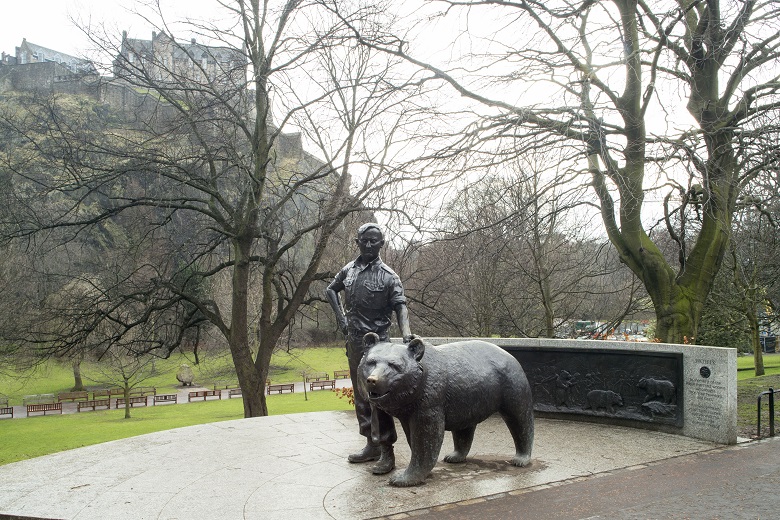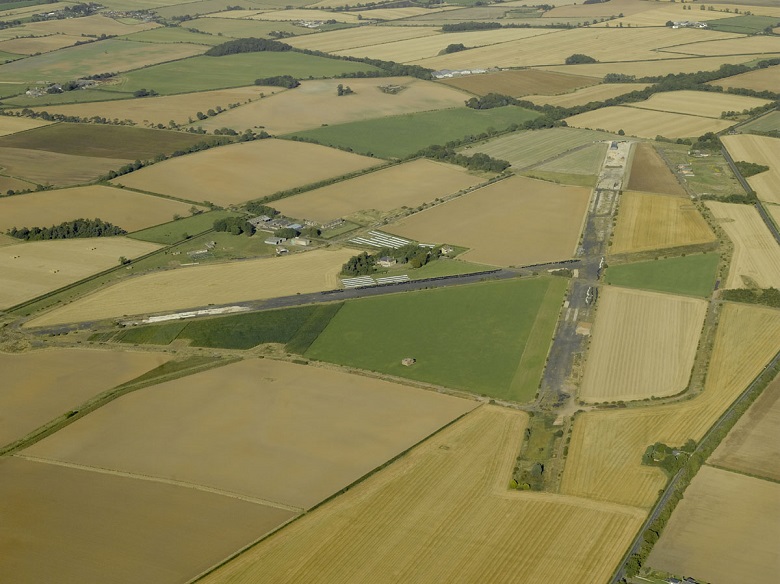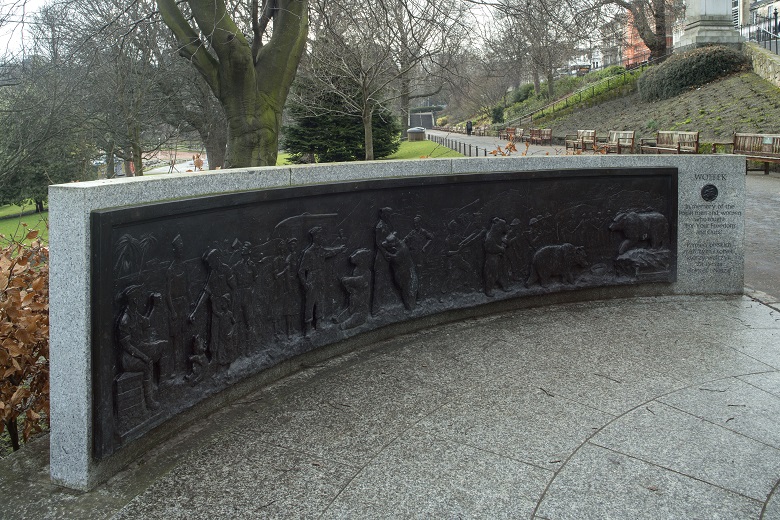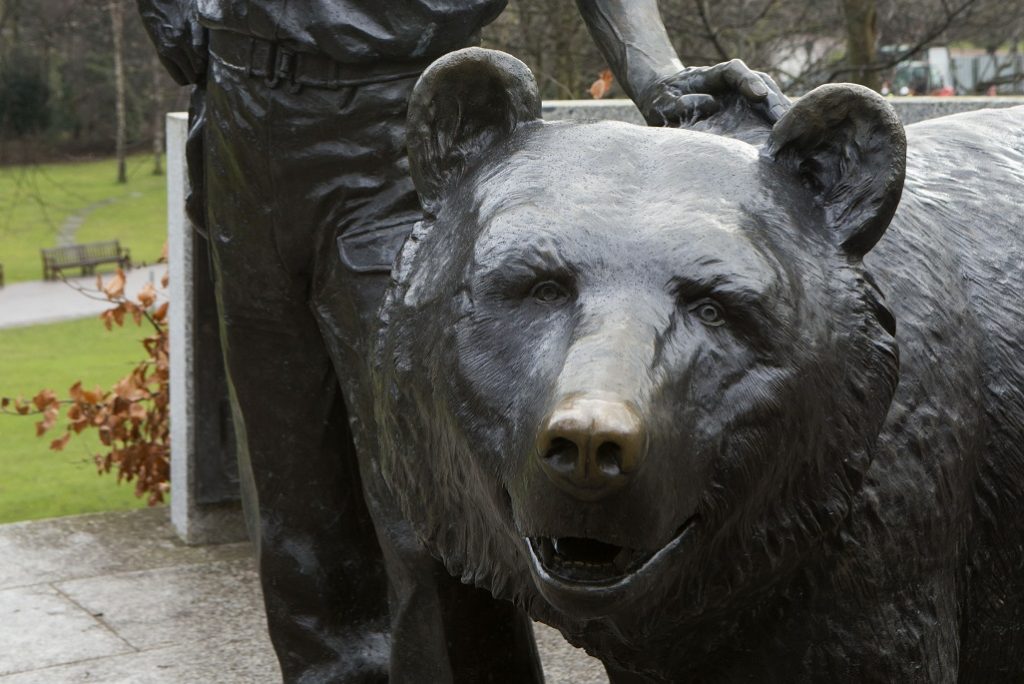Until a couple of years ago, Greyfriars Bobby held the monopoly on famous four-legged memorials in Edinburgh. But in November 2015 there was a new kid in town. More specifically, an enormous Syrian Brown Bear – Wojtek, the Soldier Bear.
The story that resulted in a memorial to a Brown Bear in the centre of Edinburgh is more than equal to the famous Greyfriars Tale. It’s a tale with roots far from Scotland, in Russia.

Wojtek’s statue stands in the shadow of Edinburgh Castle in Princes Street Gardens
and so begins a very great adventure…
In Spring 1942, Polish prisoners were released from the gulags of Siberian Russia. The camps had housed a wide range of convicts, from civilians and political prisoners to captured military forces. Among those released was the 22nd Artillery Supply Company.
The route out of Russia took the freed prisoners into Persia (Iran). Near the town of Hamedan, soldiers from the 22nd Company bought the orphan bear cub Wojtek from a young boy. They hid the bear from their senior officers but when the secret was revealed, they were given permission to keep him as a mascot.
Wojtek was fed and weaned by the Polish soldiers. He lived and travelled with them as they moved from Iran through Iraq, Syria and Palestine, into Egypt. They were en-route to Italy, to re-enter the War in Europe.
Wojtek could only stay with his army companions under an official passport. He was duly granted an army serial number and the rank of private.
Private Wojciech Perski (‘Wojtek Persian’) spent the rest of his war alongside the 22nd Company. The company adopted the figure of Wojtek carrying a shell as their official emblem. Eye-witness accounts say the bear moving around heavy artillery shells in the heat of battle was a common sight.
Why commemorate Wojtek in Scotland?
In the post-war negotiations, Britain controversially agreed to large areas of Eastern Poland under Soviet control. Many in the Polish Armies that had fought alongside the Allies did not wish to return to this situation. Instead they were offered the opportunity to live in Britain. So again, Wojtek travelled with the 22nd Artillery Supply Company, this time to Scotland for a new life.

Aerial view of Winfield Airfield
Winfield Airfield, at Hutton in the Scottish Borders, was to be Wojtek’s new home. Winfield had been a landing ground during WWI, and became a training airfield after it was re-opened in 1942. As peace was confirmed at the end of 1945, Winfield closed as an airfield, but its settlement camps remained in use by the War Office. Wojtek was stationed here with around 3000 Polish troops, as part of the Polish Resettlement Corps.
Wojtek became a normal sight for the locals of Hutton, who spotted him working and playing on the airfield. He was known for smoking cigarettes and drinking beer with his human friends. But, as the demobilised Polish soldiers began to establish a post-war life in Scotland or headed home to Poland, Wojtek could not continue this life. The much-loved bear found a permanent home at Edinburgh Zoo in 1947.
Wojtek lived a long life in the Zoo. His story was told on children’s TV and he was regularly visited by the soldiers and their expanding families. Many years after his war-time journey, the sound of a Polish accent would always raise his attentions.
He died at the zoo in 1963, aged 21. It’s probably safe to say Wojtek led the most eventful, well-travelled life of any Persian-born, Syrian Brown Bear.
A national treasure
As Scotland has become home to many more Polish people, Wojtek’s story has cemented the strong bond between the two countries. Books have been written detailing his life and documentaries made for both Polish and Scottish television have perpetuated his legend.
As far back as a decade ago, a memorial to Wojtek was proposed for Edinburgh. Thanks to the efforts of the Wojtek Memorial Trust, £300,000 was raised to erect a permanent memorial to the beloved bear.
The monument was created by Alan Beattie-Herriot (one of the UK’s top figurative sculptors) and it was cast at Powderhall Bronze fine art foundry. The 10ft bronze sculpture depicts the brown bear and a Polish soldier. It also includes a panel which depicts four scenes from Wojtek’s life. The new statue was a departure from the traditional sculptural subjects of the gardens. Two of the Polish war veterans who found Wojtek as a cub attended the unveiling.

The panel accompanying the Wojtek statue shows scenes from the bear’s life
This year, we recorded the memorial to Wojtek the Soldier Bear and added images to Canmore for all to see. Happily, this means this celebration of the ties between Scotland and Poland will be preserved for future generations.

